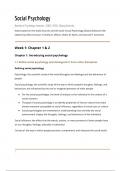Social Psychology
Bachelor of Psychology, Semester 1 (2022-2023), Tilburg University
Notes based on the video lectures and the book ‘Social Psychology (Global Edition) (10th
edition)’ by Elliot Aronson, Timothy D. Wilson, Robin M. Akert, and Samuel R. Sommers.
Week 1: Chapter 1 & 2
Chapter 1: Introducing social psychology
1.1 Define social psychology and distinguish it from other disciplines
Defining social psychology
Psychology: the scientific study of the mind (thoughts and feelings) and the behaviour of
people
Social psychology: the scientific study of the way in which people’s thoughts, feelings, and
behaviours are influenced by the real or imagined presence of other people.
● For the social psychologist, the level of analysis is the individual in the context of a
social situation
● The goal of social psychology is to identify properties of human nature that make
almost everyone susceptible to social influence, regardless of social class or culture
● Social psychologists are interested in understanding how and why the social
environment shapes the thoughts, feelings, and behaviours of the individual
Social influence: the effect that the words, actions, or mere presence of other people have
on our thoughts, feelings, attitudes or behaviour
Construal: the way in which people perceive, comprehend, and interpret the social world
1
,Social cognition: how people think about themselves and the social world; more specifically,
how people select, interpret, remember, and use social information to make judgements
and decisions
Perspectives in social psychology
Evolutionary perspective: social behaviour is explained in terms of genetic factors that are
adapted over the centuries to improve the chances of survival and reproduction
● Natural selection: the process in which important features that are beneficial for
survival are passed onto offspring - Charles Darwin
● Guppy experiment:
○ Spread guppies over 10 ponds:
■ Soils varied: 5 finesand, 5 pebbles
■ Introduce a predator (carp) in some ponds
○ Assess 1.5 years later
○ Ponds with carp:
■ Fine sand: small brown dots
■ Pebbles: bigger brown dots
○ Ponds without carp:
■ Guppies didn’t adapt their colours based on the soil but they did still
change their appearance
■ Male guppies developed very bright colours to become irresistible to
the female guppies - reproduction >
● How does evolution help to explain human behaviour?
○ People have a lot in common with other animals
■ E.g. facial expressions, displays of power
○ Some habits are universal among humans
■ Forming relationships
Socio-cultural perspective: social behaviour is explained in terms of the influence of larger
social groups
● Some habits, traditions and behaviours are different depending on the cultural
context
2
, ○ E.g., what we eat, greetings
● Cross-cultural research
○ Sharpens theories, either by demonstrating their universality or by leading us
to discover additional variables that help us improve our understanding and
prediction of human behaviour
Socio-learning perspective: social behaviour is explained in terms of learning experiences in
the past that predict future behaviour
● How does social learning help to explain human behaviour?
○ People are prone to show behaviours that they have witnessed in role
models
One perspective is not better than the other.
Social psychology, philosophy, science, and common sense:
● Social psychologists approach the understanding of social influence differently from
philosophers, journalists, or the layperson
● Social psychologists develop explanations of social influence through empirical
methods, e.g., experiments in which the variables being studied are carefully
controlled
● The goal is to discover universal laws of human behaviour, which is why
cross-cultural research is essential
How social psychology differs from its closest cousins:
● Some social psychologists attempt to explain social behaviour in terms of genetic
factors that have evolved over time according to the principles of natural selection,
adopting the approach of evolutionary psychology
● Such ideas are hard to test experimentally but can generate novel hypotheses about
social behaviour that can be tested scientifically
● When trying to explain social behaviour, personality psychologists explain the
behaviour in terms of the person’s individual character traits
● Although social psychologists would agree that personalities vary, they explain social
behaviour in terms of the power of the social situation to shape how one acts
3





